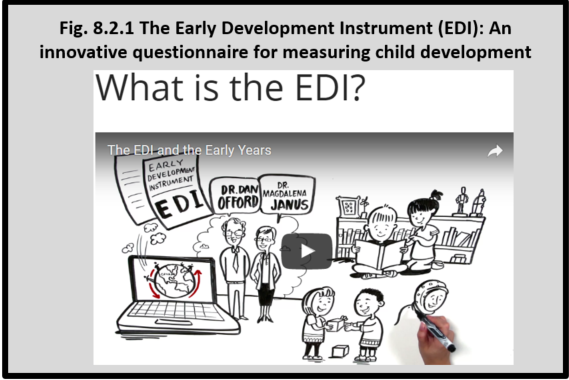The Early Development Instrument (EDI): An innovative questionnaire for measuring child development

“The Early Development Instrument (EDI) is a questionnaire developed by Dr. Dan Offord and Dr. Magdalena Janus at the Offord Centre for Child Studies at McMaster University. It is a 103-item questionnaire completed by kindergarten teachers in the second half of the school year that measures children’s ability to meet age-appropriate developmental expectations in five general domains (as described below): communication skills and general knowledge; emotional maturity; language and cognitive development; physical health and well-being; and social competence.”1
Vulnerable children are those who, without additional support and care, are more likely to experience challenges in their school years and beyond. Vulnerability is assessed for each of the five EDI domains in comparison with a cut-off based on lowest 10th percentile boundary established on a normative sample.2
Children whose scores fall below the vulnerability cut-off on a particular EDI domain are said to be vulnerable in that area of development.3
Overall vulnerability, measured by combining the information from all five domains, indicates children who are vulnerable on one or more domains of the EDI. This group reflects children who are vulnerable for problems in later childhood by casting a wide net that includes all children who may benefit from universal programs. Children in this group may be vulnerable on only one domain or may be experiencing vulnerabilities on two, three, four or all five domains of the EDI.1
1What is the EDI? https://edi.offordcentre.com/researchers/how-to-interpret-edi-results/-accessed July 31, 2017.
2 Janus, M. & Duku, E. (2007). The school entry gap: Socioeconomic, family, and health factors associated with children’s school readiness to learn. Early Education and Development, 18(3), 375-403. https://edi.offordcentre.com/wp/wp-content/uploads/2015/10/Janus-Offord-2007.pdf-accessed July 31, 2017.
3EDI BC 2016 Provincial Report. http://www.edibc2016.ca -accessed July 31, 2017.
The Early Development Instrument (EDI): A innovative questionnaire measuring child development
The EDI and an early years video was created by the team at the Offord Centre for Child Studies, McMaster University with the help of ThinkLink Graphics.
To find out more about the Early Development Instrument (EDI) or to view the video (available in English and with French subtitles) please click here.
Early Development Instrument (EDI) Domains
Communication Skills and General Knowledge
The Communication Skills and General Knowledge domain includes skills to communicate needs and wants in socially appropriate ways, symbolic use of language, storytelling, and age-appropriate knowledge about the life and world around the child.
Emotional Maturity
The Emotional Maturity domain includes the ability to think before acting, a balance between being too fearful and too impulsive, an ability to deal with feelings at the age-appropriate level, and empathetic responses to other people’s feelings.
Language and Cognitive Development
The Language and Cognitive Development domain includes reading awareness, age-appropriate reading and writing skills, age-appropriate numeracy skills, ability to understand similarities and differences, and ability to recite back specific pieces of information from memory.
Physical Health and Well-being
The Physical Health and Well-being domain includes gross and fine motor skills (e.g., holding a pencil, running on the playground, motor coordination), adequate energy levels for classroom activities, independence in looking after own needs, and daily living skills.
Social Competence
The Social Competence domain includes curiosity about the world, eagerness to try new experiences, knowledge of standards of acceptable public behaviour, ability to control own behaviour, appropriate respect for adult authority, cooperation with others, following rules, and ability to play and work with other children.
